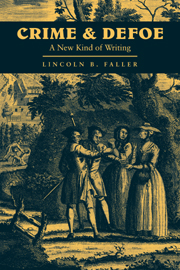Book contents
- Frontmatter
- Contents
- Preface
- List of abbreviations
- 1 Romancing the real: the “field” of criminal biography
- 2 Defoe's realism: rough frames, strange voices, surprisingly various subjects and readers made more present to themselves
- 3 The copious text: opening the door to inference, or, room for those who know how to read it
- 4 Intimations of an invisible hand: the mind exercised, enlarged, and kept in play by strange concurrences
- 5 The general scandal upon business: unanswerable doubts, and the text as a field supporting very nice distinctions
- 6 The frontiers of dishonesty, the addition and concurrence of circumstances: more on the strategic situating of names
- 7 Notions different from all the world: criminal stupidity, the self, and the symbolic order
- Closing comments: truth, complexity, common sense, and empty spaces
- Index
6 - The frontiers of dishonesty, the addition and concurrence of circumstances: more on the strategic situating of names
Published online by Cambridge University Press: 14 September 2009
- Frontmatter
- Contents
- Preface
- List of abbreviations
- 1 Romancing the real: the “field” of criminal biography
- 2 Defoe's realism: rough frames, strange voices, surprisingly various subjects and readers made more present to themselves
- 3 The copious text: opening the door to inference, or, room for those who know how to read it
- 4 Intimations of an invisible hand: the mind exercised, enlarged, and kept in play by strange concurrences
- 5 The general scandal upon business: unanswerable doubts, and the text as a field supporting very nice distinctions
- 6 The frontiers of dishonesty, the addition and concurrence of circumstances: more on the strategic situating of names
- 7 Notions different from all the world: criminal stupidity, the self, and the symbolic order
- Closing comments: truth, complexity, common sense, and empty spaces
- Index
Summary
Custom indeed has driven us beyond the limits of our morals in many things, which trade makes necessary, and which we cannot now avoid; so that if we pretend to go back to the literal sense of the command, if our yea must be yea, and our nay nay; if no man must go beyond, or defraud his neighbour; if our conversation must be without covetousness, and the like, why then it is impossible for tradesmen to be Christians, and we must unhinge all business, act upon new principles in trade, and go on by new rules: in short, we must shut up shop, and leave off trade, and so in many things we must leave off living …. But this is a subject would launch me out beyond the bounds of a letter, and make a book by itself.
The Complete English Tradesman, 1: 234–5There is … little visible Difference between the lawful Applications of Industry and Business, and the unlawful Desires after exorbitant Wealth …. getting Money is so general a Duty, that it seems to be one of the Ends of Life; how then shall we distinguish the Vertue from that Extreme? And where are the Bounds between the Duty and the Crime? The Confines of Virtue reach to the Frontiers of Vice, and where this ends that begins.
Defoe, the Commentator, No. 46 (10 June 1720)- Type
- Chapter
- Information
- Crime and DefoeA New Kind of Writing, pp. 167 - 199Publisher: Cambridge University PressPrint publication year: 1993

